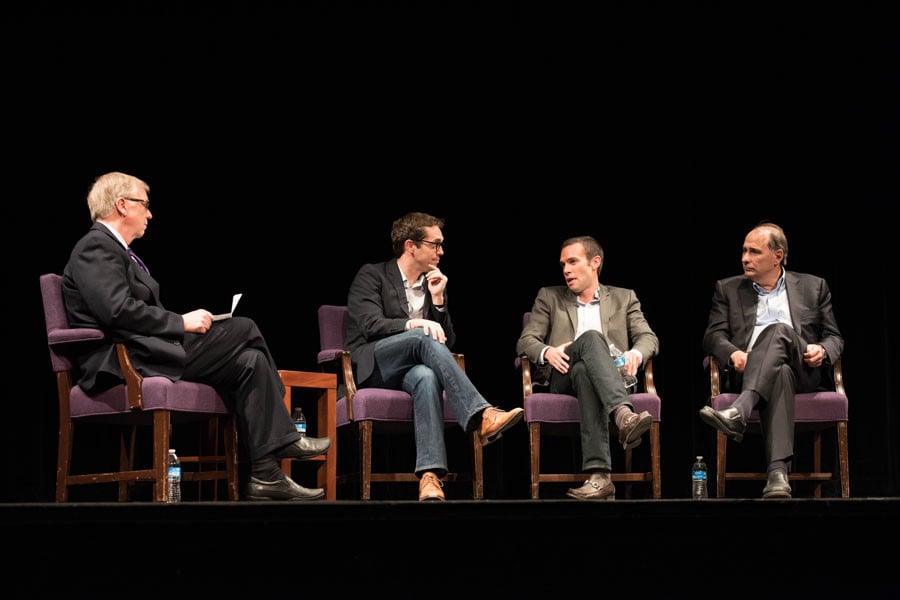Trio of Obama’s former top aides discuss president’s legacy at Northwestern talk
Sherry Li/The Daily Northwestern
Medill Prof. Larry Stuelpnagel moderates a panel in Cahn Auditorium with three of President Barack Obama’s former top aides: David Axelrod, Jon Favreau and Jeremy Bird. Much of the talk focused on the 2016 presidential election with the panelists discussing the shortcomings of the Republican Party.
November 7, 2015
Marking the three-year anniversary of President Obama’s re-election Friday, a trio of the president’s former top aides spoke to Northwestern about modern politics and Republican shortcomings.
David Axelrod, Jon Favreau and Jeremy Bird were joined in Cahn Auditorium by Medill Prof. Larry Stuelpnagel, who moderated the panel. The discussion focused on Obama’s legacy.
“Seven years ago and three days we stood in Grant Park and I had a feeling we were part of a historic campaign,” Axelrod said, referencing Obama’s 2008 election rally. “We elected a president that made a long-lasting substantive contribution to this country.”
All three panelists served Obama in some capacity: Axelrod was his senior adviser for the president’s first term, Favreau served as Obama’s speechwriter from 2005 to 2013 and Bird worked on Obama’s 2008 and 2012 presidential campaigns as a political strategist.
Much of the discussion was about next year’s presidential election, specifically Republicans’ inability to connect with minorities and shifting social values.
“They’re talking about building a wall on immigration and rolling back gay rights,” Axelrod said. “The internal dynamic of the Republican party demands that you conform to some of these positions in order to get nominated. It’s a self-defeating mechanism.”
Axelrod and Favreau both predicted Texas Sen. Ted Cruz or Florida Sen. Marco Rubio would win the Republican nomination, but warned against banking too heavily on current polls. Nationally, neurosurgeon Ben Carson and real estate mogul Donald Trump are leading, according to RealClearPolitics.
“In the Republican party there’s a civil war going on between the anti-government populists and the center-right establishment Republicans,” Axelrod told The Daily. “They’re deeply, deeply divided.”
As for the Democrats, all three panelists agreed Hillary Clinton, who leads the polls, had all but clinched the nomination. Favreau, however, expressed concern about her over-cautiousness and inability to form a cohesive message in 2008.
“The best way to run is running like you’ve got nothing to lose,” he told The Daily. “It’s being unafraid to take on the debates of the day.”
For Clinton to win, Favreau said, she needs to let loose and prove her authenticity.
College Democrats paid about $40,000 for the three speakers using money from Associated Student Government, said the group’s president Robert Bourret.
Cahn Auditorium, which holds more than 1,000 people, did not reach its full capacity on Friday, which was also the start of Family Weekend.
Politics have shifted since Obama first entered office. Facebook, which launched in 2004, was only just gaining traction and Twitter wasn’t even on the scene.
“Technology has changed politics dramatically,” Axelrod told The Daily. “Communications is instantaneous and the advent of big data gives you a really granular understanding of voters. Politics is more polarized today and there is less of a willingness to find common ground.”
At the conclusion of the panel, a student stood and asked why his vote mattered.
Citing the 2000 election, which came down to 527 votes, Axelrod said things could have been different. He surmised that if George W. Bush hadn’t become president, we’d be closer to solving climate change and wouldn’t have gone to war with Iraq.
“Politics is still an essential pursuit,” Axelrod told The Daily. “It’s still the way in which we grab the wheel of history and turn it. My hope is that well motivated individuals, whatever their political views, grab the wheel and try to steer.”
Email: [email protected].
Twitter: davidpkfishman


